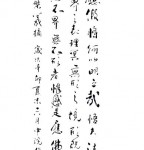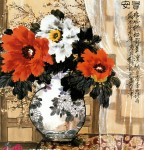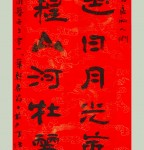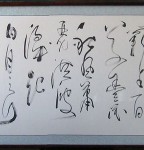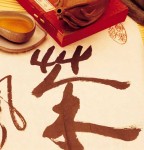P10: Live With and Without Art
The most important thing to an artist is "life" rather than "practice." To attain a high level in art, a balanced and disciplined life is a major topic besides studying art itself. It’s advisable to always maintain beginner’s mind and enthusiasm, look for long-term goals (e.g., build up foundations rather than look for quick result), and never abuse ourselves. Oftentimes an artist is so enthusiastic for his work and gets himself overly abused. Later his mind or body will revenge!
I have a big sign in my studio “No calligraphy today for a better tomorrow!” I mentally, but not necessarily or actually, disguise myself not to practice for one day to relax my mind and body. To attain a level of “practice without practice” or “live with or without art” is seemingly paradox. Yet think over its value if we can apply it.
Similar to the “practice while not practicing” notion, pianist Josef Hofmann mentioned in his book about “mental unhitching.” He suggested going out for walk after one or two hours of practice. It is absolutely necessary in order that the newly acquired results of our work may – unconsciously to ourselves – mature in our mind and get, as it were, into our flesh, bones, and blood. That which we have newly learned must become affixed to our entire organism, very much like the picture on a photographic plate is developed and affixed by the silver bath. If we allow Nature no time for this work, the result of our previous efforts will vanish and we will have to begin all over again.
The great poet Lu Yiu ( 陸游 ) told his son, “If you want to learn poetry, the learning is outside poetry. ( 汝果欲學詩, 功夫在詩外 )” There is nothing more illuminating to an artist than experiencing and observing one’s life. Many parables, anecdotes, and methods of Chinese calligraphy are discovered from everyday life rather than from theories or textbooks first.
| < Prev | Next > |
|---|
- 2011-05-06 - KUSHO: Calligraphy in The Sky, Shinichi Maruyama, Janpan Modern Art
- 2011-05-04 - Wang Xizhi, The Sage of Chinese Calligraphy
- 2011-04-23 - Ouyang Xun, one of the Four Great Calligraphers of Early Tang Dynasty
- 2011-04-07 - Chu Suiliang 褚遂良, one of the Four Great Calligraphers of Early Tang Dynasty
- 2011-01-07 - 文徵明行书《明妃曲》
- 2010-08-10 - Laozi (Lao-tzu, fl. 6th C. BCE)
- 2010-08-08 - The Dragon's Embrace - China's Soft Power Is a Threat to the West
- 2010-04-19 - The Core of Chinese Culture
- 2010-03-12 - Bringing it All Back Home: Chu Teh-Chun at NAMOC








